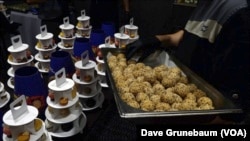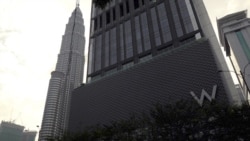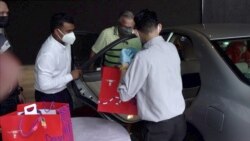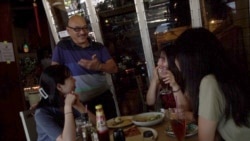At the W Kuala Lumpur hotel, high tea sets are prepared for delivery to customers celebrating the upcoming Chinese New Year. Inside are meats such as rolled smoked duck as well as tiger prawn sliders and fresh baked treats including red date cheesecake and chocolate tarts. A five-star hotel known for upscale dining in now also relies on home delivery.
“Delivery was something new and we hadn’t considered it really prior to the pandemic,” said Christian Metzner, general manager of the W Kuala Lumpur, adding that although home delivery currently makes up about 15% of his hotel’s food and beverage sales, it was 100% during periods when dining in was not allowed in Malaysia. “We started working with apps and different [delivery] companies,” he said.
Like hotels around the world, the pandemic led to a deep drop in business for the W Kuala Lumpur. Foreigners no longer flew in for vacations or business trips. So the hotel, part of the Marriott chain, pivoted and increased its marketing towards potential customers who live in Malaysia.
The hotel shut down twice during the past two years, for about three months each time. Its last closure ended in August 2021. Management says while business is still down 25% from pre-pandemic levels, during the past several months the hotel has been operating well above the break-even point, drawing customers to guest rooms and the pool for staycations as well as offering food on popular local delivery platforms.
"Just to stay in the game we had to actually connect and open our channels, open our minds to other channels to sell our products and sell our experience,” Metzner said, adding that the hotel chain’s health and safety protocols — continuously disinfecting public areas, mobile phone check-ins and other measures — also help.
Prior to the pandemic, tourism accounted for more than 15% of Malaysia’s GDP. Because so much of that business disappeared, Yap Lip Seng, chief executive officer of the Malaysian Association of Hotels, the W Kuala Lumpur’s successful shift to the domestic market a rare achievement.
“You need to set yourself apart from the pack,” Yap said, adding that the majority of the country’s hotels are still not able to turn a profit. “First, your competition is with the stand-alone restaurants outside and second, you have to compete with the same grade of hotels within that area.”
Northern Malaysia boasts the popular vacation destination of Langkawi, an archipelago known for its beaches and sea activities. For 21 years, Oli Khalid and his wife Tanja Bindemann have been running a cafe here called the Red Tomato, which has long been a gathering spot for foreign tourists who come for the fresh baked bread, big salads and warm hospitality.
“They come as strangers, travelers, and they leave as friends. That’s our motto,” said Khalid.
But Khalid and Bindemann haven’t been able to make as many new friends over the past two years. Khalid said there were times when business was down 90%.Although there has been an uptick in Malaysian customers recently, business is still half of what it was compared to pre-pandemic levels.
In November, the Malaysian government started a tourist bubble to try to draw vaccinated foreigners to Langkawi. But Khalid and other managers of local businesses said it hasn’t yet yielded a significant increase in customers.
Khalid said he has seen other local businesses close down and says if the situation doesn’t improve, his cafe might go bust in another six months. “We do have sleepless nights thinking, ‘What are we supposed to do?’” Khalid says. “What’s going to happen and what if the situation doesn’t improve, what do we do?”
The Malaysian government is considering additional steps to allow more foreign tourists inside the country. That's an idea that small mom-and-pop shops such as Khalid’s — as well as major international hotel chains like Metzner’s — say would boost their bottom lines.



